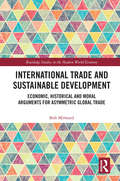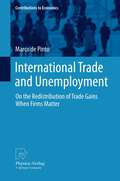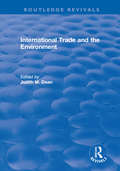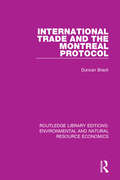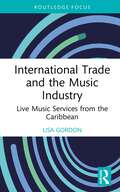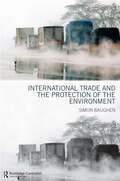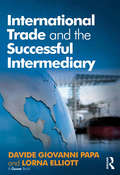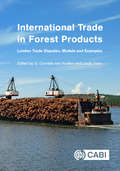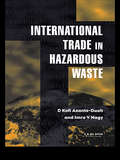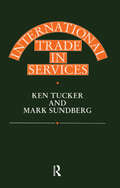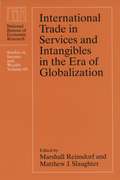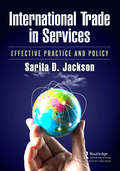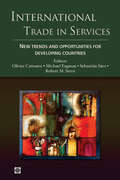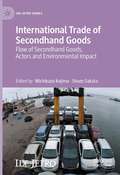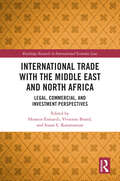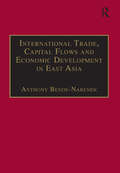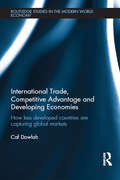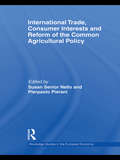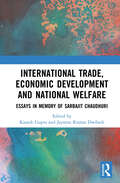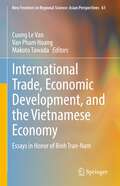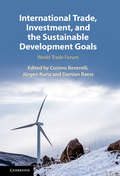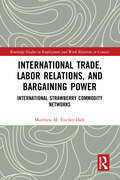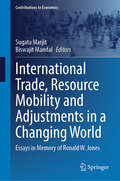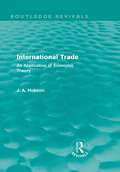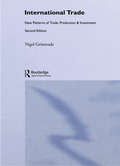- Table View
- List View
International Trade and Sustainable Development: Economic, Historical and Moral Arguments for Asymmetric Global Trade (Routledge Studies in the Modern World Economy)
by Bob MilwardThe contemporary orthodox view of world trade has centred, generally unchallenged, on the ideas of free trade, based on the theoretical construct of comparative advantage. This book will engage in a critique of the orthodox position based on the underlying theoretical economic construct, the historical development of the now developed economies and the morally unsustainable position of the free-trade regime. The author examines alternatives such as Most Favoured Nation and Preferential Trading Agreements before making the argument in favour of Asymmetric Trading, where the underdeveloped economies can develop behind tariff barriers and quotas, whilst the triadic nations maintain a lack of barriers to the exports of these economies. He outlines how such a trading regime would be mutually beneficial in the long term, in the sense that development through industrialisation takes place and the increase in GDP per capita would allow markets for exports to be sustainable, thus widening the market for the goods and services of the developed economies. However, the author demonstrates that free trade actually increases the development gap by maintaining the status quo in terms of the underdeveloped economies specialising in and exporting low value-added primary products and importing high value-added manufactures. The book analyses contemporary and historical data to illustrate how an alternative trading regime can be truly advantageous to both the developed and underdeveloped regions of the world: a global trading regime that is capable of increasing GDP in a sustainable manner without transferring a surplus from the poor to the rich nations and without a long-term commitment on the part of the developed nations to altruism.
International Trade and Unemployment
by Marco De PintoEconomic theory and empirical research confirm that the rising international integration caused an increase in aggregate income at least for the industrialized countries, although trade liberalization is no Pareto improvement. In the empirical literature, there is a consensus that the international integration implies a destruction of low-skilled job vacancies and an increase in income, while the conclusions are mixed concerning the implication for the overall unemployment rate. This book seeks to find theoretical explanations to these empirical regularities. The book poses three questions: What are the implications of trade liberalization for the labor market in the presence of trade unions if we account for both firm and worker heterogeneity? What are the implications of a redistribution policy if the government chooses unemployment benefits to partially compensate the losers of trade liberalization?, and what is the optimal redistribution scheme for trade gains if the government explicitly takes into account the consequences for the income distribution? This book presents a rigorous theoretical analysis to answer the questions posed. Beside the well-known firm-selection effect on goods markets caused by trade liberalization, a selection process on the labor market -the worker-selection effect - is presented. The book also argues that if welfare is measured in the traditional manner, i.e. income per capita, compensating the loser of trade liberalization by paying unemployment benefits decreases welfare, but the intensity of the reduction differs with respect to the chosen funding of the unemployment benefits. Another significant contribution of this book is that if the objective function of the government, i.e. the modified welfare function, includes both aggregate income and income inequality, the redistribution of trade gains can lead to an increase in welfare.
International Trade and the Environment (Routledge Revivals)
by Judith M. DeanThis title was first published in 2002: The interrelationship between international trade and the environment has become the subject of much heated debate. These complex and strong concerns are given voice in this comprehensive and accessible text that brings together the leading journal articles dealing with the fundamental questions about this most important international problem. International Trade and the Environment offers an invaluable source of contemporary international research for all those researching, studying or practicing across the fields of international trade, environmental economics, applied microeconomics and other related areas.
International Trade and the Montreal Protocol (Routledge Library Editions: Environmental and Natural Resource Economics)
by Duncan BrackOriginally published in 1996. The Montreal Protocol on Substances that Deplete the Ozone Layer is one of the most effective multilateral environmental agreements currently in existence. Established to control the production and consumption of CFCs and other ozone-depleting chemicals, the Protocol is an important example of an agreement which places restrictions on international trade in the interests of the global environmental – a feature which may become common in future treaties. This report examines the development, effectiveness and future of the trade provisions of the ozone regime, concluding that they have contributed significantly to its success in attracting signatories and in limiting ozone depletion. Issues considered include the compatibility of the trade provisions and the GATT, trade restrictions and developing countries, and the new problems of non-compliance and illegal trade in CFCs.
International Trade and the Music Industry: Live Music Services from the Caribbean (Routledge Studies in the Economics of Business and Industry)
by Lisa GordonLive music events are synonymous with fun but seldom associated with international trade. This book serves to transform this mindset, through describing the economic value of live music and analysing the factors affecting international trade in Caribbean live music services. Race and ethnicity, unachieved regionalism within the Caribbean, and perceived biases in international trade agreements are assessed in relation to their impact on this trade. Several topics presented in this book are based on empirical findings from a previous microeconomic study, dedicated entirely to international trade in live music. Moreover, this book is unique because it compares the Caribbean and South Korea to assess the effectiveness of strategies aimed at developing international trade in live music services. This comparison should inspire robust policy initiatives for advancing international trade in Caribbean live music, given that South Korea is presently a heavyweight in the export of its entertainment services, despite language barriers. Given the interdisciplinary nature of this book, it will appeal to a wide range of readers such as postgraduate students or researchers of microeconomics, intraregional trade, international trade, international business, international relations, public policy, and cultural studies, as well as IP legal professionals, live music stakeholders, cultural practitioners, and policymakers.
International Trade and the Protection of the Environment
by Simon BaughenAnalyzing globalization and the increasing tension it has caused between the goals of free trade and environmental protection, International Trade and the Protection of the Environment provides a comprehensive and detailed legal analysis, both at the national and international level of what looks set to become the new legal order of the twenty-first century.This book asks the questions does the treatment of ‘measures tantamount to expropriation’ have the capacity to lead to a ‘regulatory chill’ on environmental protection and what are the possibilities for claims before the UK courts that are based on alleged violations of international law?To answer them the author offers:an informed and critical commentary on the continuing controversy on GMO products, in particular on the recent WTO award in the EC-Biotech disputea comparison of the treatment of the expropriation under NAFTA and bilateral investment treaties with position under article one of the first protocol of the European convention on human rightsan analysis of the human rights dimension to claims for environmental damage against multi-national corporations, focusing particularly on claims in the US under the Alien Trot Claims Act 1789.Incisive and current, this text is a valuable tool for postgraduate law students studying international and commercial law.
International Trade and the Successful Intermediary
by Lorna Elliott Davide Giovanni PapaInternational Trade and the Successful Intermediary reveals how intermediaries can safely and effectively guarantee they are paid commission in lucrative commodity trades. Davide Papa and Lorna Elliott explain how intermediaries should conduct a deal from start to finish, whilst adhering to the laws and rules of international trade and maintaining control over the transaction at all times. The explosion of the internet has created tens of thousands of trading houses and independent home-based brokers all seeking to buy or sell commodities to one another. Businesses may spend considerable time and resources evaluating the merits or otherwise of available brokers. International Trade and the Successful Intermediary is designed to give independent intermediaries, potential buyers, procurement agents, mandates, lawyers, bankers and companies the fundamental skills to conduct business in the international trade arena, while increasing their knowledge and confidence to secure commission arising out of successful deals. Using real scenarios, model documents and straightforward language the book dispels the many myths relating to internet trading procedures and explains the rules and laws that must be adhered to when conducting import/export transactions.
International Trade in Forest Products: Lumber Trade Disputes, Models and Examples
by Craig Johnston Harry Nelson Joseph Buongiorno Jinggang Guo Xintong Li Fatemeh Mokhtarzadeh Prakash Nepal Jeffrey Prestemon Brad StennesBecause of the long-standing Canada-U.S. lumber trade dispute and the current pressure on the world's forests as a renewable energy source, much attention has been directed toward the modelling of international trade in wood products. Two types of trade models are described in this book: one is rooted in economic theory and mathematical programming, and the other consists of two econometric/statistical models--a gravity model rooted in theory and an approach known as GVAR that relies on time series analyses. The purpose of the book is to provide the background theory behind models and facilitate readers in easily constructing their own models to analyse policy questions that they wish to address, whether in forestry or some other sector. Examples in the book are meant to illustrate how models can be used to say something about a variety of issues, including identification of the gains and losses to various players in the North American softwood lumber business, and the potential for redirecting sales of lumber to countries outside the United States. The discussion is expanded to include other products besides lumber, and used to examine, for example, the effects of log export restrictions by one nation on all other forestry jurisdictions, the impacts of climate policies as they relate to the global forest sector, and the impact of oil prices on forest product markets throughout the world. This book will appeal to practising economists and researchers who wish to examine various policies that affect international trade, whether their interest is local or international in scope. Because the book provides the theoretical bases underlying various models, students and practitioners will find this a valuable reference book or supplementary textbook.
International Trade in Hazardous Wastes
by D.K. Asante-Duah I.V. NagyThis book discusses the need for a regulated and informed forum for international trade in hazardous waste. The authors argue that with careful planning, health and ecological risks can be minimized and net economic benefits realized fairly. The book examines the key parameters that should be considered by potential trading nations to ensure an opt
International Trade in Services
by Ken Tucker Mark SundbergInternational trade in services is emerging as an important area of study. Governments are becoming increasingly aware of the significance of services in both trade and investmnet relationships. This book is based om researh carred out as part of the ASEAN- Australia Joint Rsearch Project, Its is of relevance internationally as well as to the Paficic Rim countries for its consideration of both theoretical and policy aspects. Case studies are presented for each country of the origonal ASEAN members: Sinagpore, Malaysia, Indonesia, Thailand, the Philippines and on touriam, telecommunications, air transport and consulatncy services.
International Trade in Services and Intangibles in the Era of Globalization
by Marshall Reinsdorf Matthew J. SlaughterThe celebrated economist Zvi Griliches's entire career can be viewed as an attempt to advance the cause of accuracy in economic measurement. Hard-to-Measure Goods and Services, a collection of papers from an NBER conference held in Griliches's honor, is a tribute to his many contributions to current economic thought. Here, leading scholars of economic measurement address issues in the areas of productivity, price hedonics, capital measurement, diffusion of new technologies, and output and price measurement in "hard-to-measure" sectors of the economy.
International Trade in Services: Effective Practice and Policy
by Sarita D. Jackson"In 2012, U.S. and European firms accounted for the highest share of revenue generated by the top international architecture and engineering firms in Africa, at 27 and 31 percent, respectively," according to a U.S. International Trade Commission trade brief. These findings show that the growth of company revenues in an overseas market does not just have to depend on the sale of manufactured products or agricultural commodities. Opportunities also exist for service providers. International Trade in Services: Effective Practice and Policy addresses a reality that receives minimal attention in the current debate about international trade—how the export and import of services drive a significant portion of international trade. The United States has a US$269 billion surplus in trade in services with the world. On other hand, U.S. trade in goods with the world continues to experience a wide trade deficit of US$946 billion. Nevertheless, U.S. policy response focuses mainly on the manufacturing and agricultural sectors. In addition, as an international trade educator in business schools at different universities, many of the textbooks emphasize the various aspects of importing and exporting goods. Workshops aimed to educate and inform the business community also focus on the trade in goods. Consequently, business students and practitioners miss another important component of international trade that presents opportunities—trade in services. The book provides a simple, yet thorough, introduction on how to export a service to an overseas market. The book will guide its audience with a step-by-step process on exporting a service from research to strategy to implementation. Furthermore, the book will highlight the opportunities presented by the international-level General Agreement on Trade in Services (GATS) and bilateral and regional-level reciprocal trade agreements. Service providers will be able to use the book as a guide to start the export process successfully with the first step. Essentially, the book will provide results in the following areas: Time saving—The step-by-step process, which highlights various programs, and the list of key resources will save future exporters of a service the time that they would spend trying to just understand another market. Frustration reduction—The book’s outline of the formal mechanisms available to service exporters will save them from the frustration that may arise from encountering trade practices, some of which can also be very costly, in different markets that make it difficult to compete against local service providers. Money saving—Having substantive knowledge of formal mechanisms and key resources that help to reduce the risks associated with exporting to another market, such as not receiving payment, will help the services-based exporter to use its financial resources more efficiently while reducing its risk of nonpayment.
International Trade in Services: New Trends and Opportunities for Developing Countries
by Olivier Cattaneo Robert M. Stern Sebastián Sáez Michael EngmanThe services sector is key to economic growth, competitiveness, and poverty alleviation. Comprising more than two-thirds of the world economy, services are now commonly traded across borders, helped by technological progress and the increased mobility of persons. In recent years, a number of developing countries have looked at trade in services as a means to both respond to domestic supply shortages and to diversify and boost exports. Any country can tap into the trade potential of services, but not every country can become a services hub across sectors. The opening of the services sector potentially comes with large benefits, but also fears and costs that should not be overlooked. This book provides useful guidelines for the assessment of a country's trade potential, and a roadmap for successful opening and export promotion in select services sectors. It looks at both the effects of increased imports and exports, and provides concrete examples of developing country approaches that have either succeeded or failed to maximize the benefits and minimize the risks of opening. It focuses on sectors that have been rarely analyzed through the trade lens, and/or have a fast growing trade potential for developing countries. These sectors are: accounting, construction, distribution, engineering, environmental, health, information technology, and legal services. This book is designed for non-trade specialists to understand how trade can help improve access to key services in developing countries, and for trade specialists to understand the specific characteristics of each individual sector. It will be a useful tool for governments to design successful trade opening or promotion strategies, and for the private sector and consumers to advocate sound domestic policy reforms accompanying an offensive trade agenda.
International Trade of Secondhand Goods: Flow of Secondhand Goods, Actors and Environmental Impact (IDE-JETRO Series)
by Shozo Sakata Michikazu KojimaThis book demonstrates the flow of the international trade of secondhand goods and examines the socio-economic background and mechanisms of the trade. It highlights the actors involved in the trade of secondhand goods and how traditionally secondhand good have largely been traded through social or ethnic networks in order to effectively transfer quality and market information. The development of information technology and emergence of new information platforms have changed these business models. The policies and regulations relating to the trade of secondhand goods are explored, alongside the negative impact of these trades, and the growing awareness of the circular economy. This book illustrates how importing countries as well as international institutions have developed regulations in order to balance these two issues. It will relevant to students and economists interested in development economics and economics geography.
International Trade with the Middle East and North Africa: Legal, Commercial, and Investment Perspectives (Routledge Research in International Economic Law)
by Hossein Esmaeili, Vivienne Brand, and Susan L. KaramanianThis book provides an interdisciplinary analysis of trade relations with the Middle East and Arab countries from the perspectives of law, business, policy and culture in the Middle East and the Arab world and their interaction with the wider world, particularly Western countries.The rapidly evolving economy of the Middle East and the Arab region is undergoing significant change, and establishing modern foreign ownership law, robust company, business and investment regulations, modern legal professions while keeping its basic traditional and Islamic principles. This book covers a number of important theoretical and practical aspects of commercial and trade relationships and law. It examines case studies of trade and investment relations between Arab and Middle Eastern countries and Western Countries, such as Australia, UK and US, touching on such topics as corporation law, arbitration and foreign judgments, future mobility and disruptive technology law, financial services law, charity law, trusts and cultural law.Exploring emerging trade and investment ties between Arab and Middle Eastern countries and Western countries, it will be of interest to students, academics and practitioners with an interest in international trade and investment law.
International Trade, Capital Flows and Economic Development in East Asia: The Challenge in the 21st Century
by Anthony Bende-NabendeThe book provides an understanding of how international trade and capital flows have engineered the development process in East Asia, and examines the real and potential challenges that the region is expect to encounter in the twenty-first century. It integrates four topics (i.e. capital flows, East Asia, globalization and economic development) that are at the centre of the social, political and economic debate. The text highlights the region's growing strategic importance in the twenty-first century globalizing world, where transnational corporations are playing an increasingly decisive role in the global distribution of production and trade. It blends generalised regional analyses with country-specific case studies in the world's most dynamic region. It is so well designed that each of the seventeen countries that comprise the region gets some space for discussion. Thus, the text is a valuable contribution to the social science and business literature, with a special focus on the now strategic region of East Asia.
International Trade, Competitive Advantage and Developing Economies: Changing Trade Patterns since the Emergence of the WTO (Routledge Studies in the Modern World Economy)
by Caf DowlahAvailable research suggests that less developed countries have significant competitive advantage over developed countries in three major areas of international trade: agriculture, textiles and clothing (T&C), and cross-border labor mobility. Incidentally, these are also the trade sectors which experienced widespread protectionist measures, especially in developed world, for decade after decade. Under the World Trade Organization (WTO), which replaced the General Agreement on Tariff and Trade (GATT) in 1995, much of the restrictions in T&C trade has been phased out, but still this sector faces much higher tariff and non-tariff barriers than any other manufacturing sector in world economy. The agricultural sector also experienced significant dismantling of deeply entrenched trade barriers under the WTO over the course of last two decades, but the sector still remains plagued with quite extensive domestic supports, export subsidies, and tariff barriers. At the same time, despite both theoretical expositions and empirical trends point to significant potential gains from cross-border labor mobility, the sector remains mired in a complex quagmire of economic and political restrictions around the world. Thus, all three sectors in which less developed countries have exports interests still remain less liberalized than the sectors in which developed countries have exports interests. This book provides an in-depth and up-to-date scholarly analysis of all three trade sectors—agriculture, T&C and cross-border labor mobility—with a penetrating scrutiny of historical backgrounds and developments, crosscurrents of interests and perspectives of both developed and developing countries, and evolving trade patterns and potentials in a more liberalized and globalized world economy. The book also identifies critical economic issues and options for less developed countries in the WTO negotiations for further liberalization of agriculture, T&C, and cross-border labor mobility. This volume will be an important point of reference for students, scholars, and practitioners of international trade, economic development, development economics, and WTO-related issues.
International Trade, Consumer Interests and Reform of the Common Agricultural Policy (Routledge Studies In The European Economy Ser. #22)
by Susan Senior NelloThe European Union has launched an important debate on the future of the EU budget from 2013. This discussion is to cover all aspects of EU revenue and expenditure, including that on the Common Agricultural Policy (CAP). The CAP has been radically transformed in recent years, but the issue of its reform, including its goals, its effectiveness in reaching them and the question of division of responsibility and financing between the EU and member states, is once again at the centre of attention. This collection features well-known experts in the field and aims to contribute to the debate on the present state and future prospects of the CAP and other EU policies. The topics covered range from the EU budget to food safety, rural development, sustainable food consumption, and the influence of international trade negotiations. Many of the ideas presented here are original and controversial and intended to fuel the debate on this important topic. For instance, there are various proposals for the EU budget, the division of responsibilities between the EU and its member states, and the shape of the CAP post-2013.
International Trade, Economic Development and National Welfare: A General Equilibrium Approach
by Kausik Gupta and Jayanta Kumar DwibediThis book presents a comprehensive analysis of contemporary issues in international trade and economic development. Emphasising the significance of economic development within policymaking, the book covers important issues like the provisioning of public goods, its implication in a liberalised regime, crime and corruption, skilled–unskilled wage inequality, income distribution and unemployment, environmental regulation and role of educational capital and informal sector. The volume deals with the impact that different aspects of international trade and investment are likely to have on the above-mentioned areas. The essays, written to honour the memory of Professor Sarbajit Chaudhuri, also examine topics that focus on public policy related to immigration of skilled workforce, political resistance and political compulsions that a democratic government might face in keeping with its commitment to tariff reforms, gender wage gap and issues related to globalisation, income distribution and unemployment. The book will be of invaluable interest to postgraduate students, scholars and researchers of development economics, international economics and labour economics and to those working on theoretical research on applications of general equilibrium trade models in developing countries.
International Trade, Economic Development, and the Vietnamese Economy: Essays in Honor of Binh Tran-Nam (New Frontiers in Regional Science: Asian Perspectives #61)
by Makoto Tawada Cuong Le Van Van Pham HoangThis volume spotlights some of the most important economic issues confronting today's emerging developing countries. The topics studied in the book include the importance of productivity to economic growth, international trade and its relationship to productivity; immigration and brain drain; pollution havens, climate change, and the carbon tax; the effectiveness of foreign aid, the efficiency of education, and governance. Written by some of the most respected scholars in their respective fields, the individual chapters apply both economic theory and the most current empirical tools in rigorous but accessible exposition. Researchers can find value in the modeling and empirical techniques that can be applied to other countries and datasets. Policy makers can benefit from the intellectual foundation on which decisions on important issues can be based; and students of international trade, economic development, and environmental economics can gain knowledge of different country settings that give context to their fields of study.
International Trade, Investment, and the Sustainable Development Goals: World Trade Forum
by Jürgen Kurtz Cosimo Beverelli Damian RaessIn September 2015, world leaders adopted the 2030 Agenda for Sustainable Development. The Sustainable Development Goals (SDGs) represent a distinctive approach to development that moves away from a narrow perspective on economic development to an integrative agenda that simultaneously pursues ecological, social and economic goals. Trade and foreign investment are important economic vectors through which many of these goals can be achieved. Much depends, however, on whether and how SDGs are incorporated in international trade and investment agreements, and in private or public sector initiatives. Policymakers are also confronted with the interdependence of the SDGs which raises difficult trade-offs between various Goals. The contributions in this book explore the penetration and trade-offs of the SDGs, drawing on a multi-disciplinary approach incorporating insights from economists, lawyers and political scientists. The book offers a valuable guide for scholars and policy makers in identifying and evaluating the complex challenges related to sustainable development.
International Trade, Labor Relations, and Bargaining Power: International Strawberry Commodity Networks (Routledge Studies in Employment and Work Relations in Context)
by Matthew M. Fischer-DalyInternational Trade, Labor Relations, and Bargaining Power: International Strawberry Commodity Networks examines power in the commercial food system through the history of always available strawberries. Applying an interdisciplinary approach to case studies on strawberry production and sales in Mexico, Spain, and the United States, the author untangles the symbiotic relationships between the economic boom and labor strife in the sector. By comparing workers’ struggles in the sector, he develops a novel model of workplace bargaining power in which the process of dignity catalyzes change. Since international trade in strawberries began three decades ago, the sector’s growth has paralleled the rise of retailer dominance of food sales. Highlighting inequitable gains from the sales boom, workers have organized mass strikes, boycotts, and pressure campaigns. The divergent results ranged from ephemeral acknowledgments of workers’ concerns to the establishment of union collective bargaining and steadily improving working conditions. Grounded in extensive research, the book provides fresh analytical approaches to understanding the social dimensions of international trade and workplace bargaining power. The book unpacks the relationship between poor working conditions and economic growth by applying a new method, international commodity network analysis, which builds on prior global supply chain approaches. It explains differences in workers’ initiatives to improve employment conditions by identifying the process of dignity in the creation of solidarity.
International Trade, Resource Mobility and Adjustments in a Changing World: Essays in Memory of Ronald W. Jones (Contributions to Economics)
by Sugata Marjit Biswajit MandalThis volume mainly focuses on the relevance and application of Heckscher-Ohlin Model and Specific Factors Model of trade, while also addressing other latest global issues which are connected with two most celebrated structures of trade models developed by the legendary trade theorist Prof. Ronald Winthrop Jones. The two models were published as 'The Structure of Simple General Equilibrium Models' (1965) and 'A Three Factor Model in Theory, Trade and History' (1971). Both the structures are used extensively by trade economists and development economists to decipher a bunch of interesting and intertwined ideas. The models being easy to follow, are capable of explaining some contemporary global concerns if modified judiciously. This includes both theory and policy in both competitive and imperfectly competitive markets. It also has some empirical dimensions. This book is a must read for those who want to keep abreast of latest frontiers in the domain of research on internationaltrade theory and policy, especially advanced graduate students, researchers, and policy makers in general. It exposes its readers to methodological techniques and contemporary research issues so that one can easily draw clues, in terms of both relevant techniques and future research directions, to carry on their own research; policy makers can understand the channels of possible welfare improvement owing to new policy changes.
International Trade: An Application of Economic Theory (Routledge Revivals)
by J. A. HobsonFirst published in 1904, this important economic work explores some of the leading principles underlining the development of international trade. Hobson offered a departure from the conventional treatment of international trade in economic theory, simplifying concepts of free trade, exchange and tariffs and considering the practical application of theory in a manner accessible to the reader.
International Trade: New Patterns of Trade, Production and Investment
by Nigel GrimwadeThis new edition has been rewritten to provide an up-to-date, clear and comprehensive account of the most important developments currently taking place in the world economy. The text introduces the major economic theories and models with an emphasis on changes within the world trading system and how governments respond. New features include:* an expansion of chapter three to include formal models of intra-industry trade under imperfect competition * two separate chapters on Japan and newly industrialising countries, updating and incorporating new material* new sections on Strategic Trade Policy and on the Political Economy of Protectionism * a new chapter on the institutional aspects of world trade in discussing the deliberations of the World Trade Organisation
